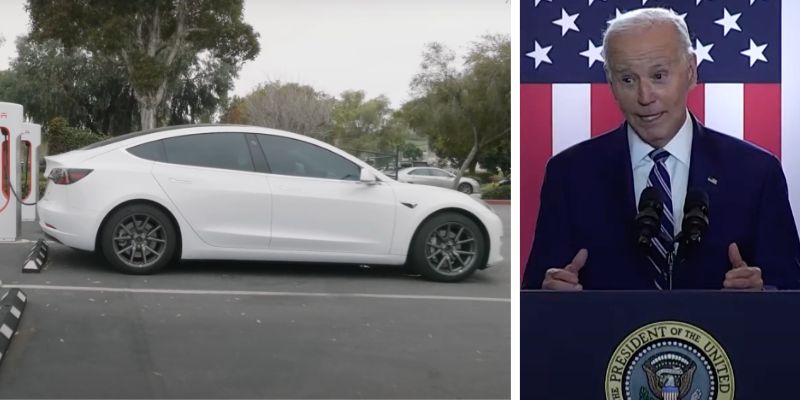Renewed Opposition To EV Mandates From Car Dealerships Nationwide

Table of Contents
Economic Concerns Fueling Dealer Resistance
The economic challenges associated with transitioning to EV sales are a primary driver of the renewed opposition to EV mandates. Dealerships are facing significant financial hurdles, impacting their profitability and potentially threatening their viability, especially for smaller, independent businesses.
- High upfront costs of EV inventory: Electric vehicles often have a higher sticker price than comparable gasoline-powered cars, requiring dealerships to invest substantially more capital in inventory. This is particularly problematic given fluctuating consumer demand.
- Lack of consumer demand in certain areas: While EV adoption is increasing, demand remains uneven across geographic regions. Dealerships in areas with lower EV adoption rates face the risk of being saddled with unsold inventory, leading to financial losses.
- Insufficient government support for infrastructure upgrades: Many dealerships need to invest in costly infrastructure upgrades, such as installing EV charging stations, to accommodate the sale and service of electric vehicles. Government support for these upgrades has been insufficient in many cases.
- Reduced profit margins on EVs compared to gasoline-powered vehicles: In some instances, the profit margins on EVs are currently lower than on gasoline-powered vehicles, squeezing dealerships' already tight profit margins.
This financial strain is particularly acute for smaller dealerships that lack the resources to absorb these costs and adapt quickly to the changing market landscape. Many have voiced concerns about potential business closures if current trends continue. Several regional dealer associations have publicly expressed these concerns, citing specific examples of dealerships facing financial hardship due to EV sales targets. The automotive industry transition needs to address these economic realities to ensure a fair and sustainable shift. Understanding the impact on dealership profitability is crucial for effective EV policy.
Infrastructure Gaps and Consumer Readiness
A critical factor fueling the renewed opposition to EV mandates is the lack of adequate charging infrastructure and the associated consumer concerns. While the number of public charging stations is increasing, it remains insufficient to meet the demands of widespread EV adoption.
- Insufficient public charging stations: The density and accessibility of public charging stations, particularly in rural areas, are still significantly lacking.
- Long charging times: Compared to refueling a gasoline car, charging an EV can take considerably longer, causing range anxiety among consumers.
- Range anxiety among consumers: The limited range of many EVs compared to gasoline cars is a significant barrier for many potential buyers, particularly those who regularly travel long distances.
- Uneven distribution of charging networks: Charging stations are not evenly distributed geographically, leaving some areas underserved and hindering widespread EV adoption.
Beyond the infrastructure challenges, many consumers remain hesitant due to concerns about EV technology, the initial cost of purchase, and potential maintenance issues. Analyzing consumer adoption of EVs reveals a clear correlation between charging infrastructure availability and purchase intent. Effective EV infrastructure investment is vital to address this range anxiety and accelerate consumer acceptance.
Training and Workforce Challenges
The transition to electric vehicles also presents significant training and workforce challenges for dealerships. EVs have different mechanical systems and require specialized knowledge and skills for repair and maintenance.
- Lack of qualified technicians: A shortage of qualified technicians trained to work on EVs is emerging, creating a bottleneck in servicing and maintenance.
- Investment needed in training programs: Dealerships must invest in expensive training programs to upskill their existing workforce and recruit new technicians with the necessary EV expertise.
- Increased complexity of EV repair: Repairing EV components is often more complex and requires specialized tools and diagnostic equipment, increasing costs.
- The need for upskilling existing staff: Dealerships must invest resources in retraining existing staff to work on the new technologies associated with electric vehicles.
The costs associated with this retraining, combined with the potential shortage of skilled labor, are adding to the financial burden on dealerships. Effective automotive workforce development programs are critical for addressing this skills gap and facilitating a smooth transition to the EV era. Addressing EV technician training needs is essential for the successful long-term adoption of electric vehicles.
Political and Regulatory Uncertainty
The constantly evolving political and regulatory landscape surrounding EV mandates contributes significantly to the renewed opposition. Dealership investment decisions are heavily influenced by the perceived stability and predictability of government policies.
- Uncertainty regarding future mandates: Frequent changes to EV sales targets and related regulations create uncertainty, making it difficult for dealerships to make long-term investment decisions with confidence.
- Inconsistencies in state and federal regulations: Variations in regulations across different states further complicate the situation, increasing compliance costs and creating administrative hurdles.
- Concerns about potential government overreach: Some dealerships express concerns that government mandates are overly aggressive and fail to consider the economic realities facing the industry.
Automotive lobbying groups representing dealer associations are actively engaging in discussions with policymakers to advocate for more realistic and economically viable approaches to EV adoption. This political influence on EV adoption highlights the need for a collaborative approach that balances environmental goals with the needs of the automotive industry. Navigating the complex landscape of EV policy requires a careful balance between environmental goals and economic realities.
Conclusion: The Future of EV Mandates and Dealer Opposition
The renewed opposition to EV mandates from car dealerships nationwide stems from a convergence of economic, infrastructural, workforce, and regulatory challenges. The high upfront costs of EV inventory, lack of sufficient charging infrastructure, the need for specialized training, and the uncertainty surrounding government policies are all contributing factors. The significance of this opposition cannot be underestimated; it underscores the need for collaborative solutions between policymakers, automakers, and dealerships. A successful transition to electric vehicles requires a comprehensive strategy that addresses the concerns of all stakeholders, ensuring a just and sustainable path forward. What solutions can bridge the gap between EV mandates and the concerns of car dealerships nationwide? Learn more about the debate surrounding renewed opposition to EV mandates and its implications for the future of sustainable transportation.

Featured Posts
-
 Melissa Gorga Reveals A Lister Seeking Nj Beach House Invite
May 02, 2025
Melissa Gorga Reveals A Lister Seeking Nj Beach House Invite
May 02, 2025 -
 Energievoorziening Bio Based Basisscholen Een Actueel Probleem
May 02, 2025
Energievoorziening Bio Based Basisscholen Een Actueel Probleem
May 02, 2025 -
 Tuerkiye Endonezya Ortak Anlasmalari Yeni Bir Doenemin Baslangici
May 02, 2025
Tuerkiye Endonezya Ortak Anlasmalari Yeni Bir Doenemin Baslangici
May 02, 2025 -
 Unlawful Harassment Allegations Against Rupert Lowe In Reform Shares Report
May 02, 2025
Unlawful Harassment Allegations Against Rupert Lowe In Reform Shares Report
May 02, 2025 -
 The Ripple Effect How Etf Decisions And Sec Changes Could Shape Xrps Future
May 02, 2025
The Ripple Effect How Etf Decisions And Sec Changes Could Shape Xrps Future
May 02, 2025
